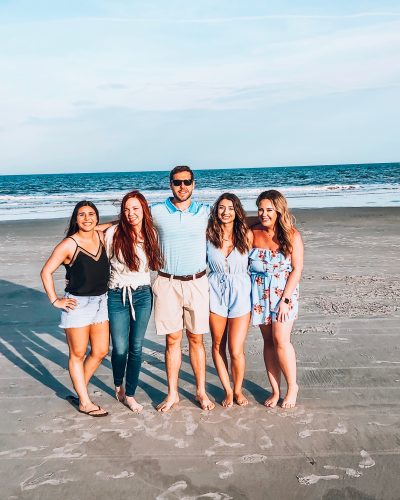Q&A: ATSU PA students save a life at the beach
Posted: July 30, 2019
A group of students from A.T. Still University’s Arizona School of Health Sciences’ (ATSU-ASHS) Physician Assistant Studies program was staking out a spot on the beach at Hilton Head Island, South Carolina, when a woman collapsed nearby. Their quick action saved her life. One of the student heroes, Mikayla Freeman, PA, ’19, told us about the experience.
Q: Why did you decide to go to the beach that day?
A: We had a free weekend, which was kind of unusual. All five of us were off that weekend, not working in the clinics or hospitals, and we decided to go on a little road trip. We chose to go to Hilton Head Island, South Carolina. That Saturday, we decided to go to the beach.
Q: How did you realize something was wrong, and how did you react? Did you need a moment to figure things out?
A: We got there, and we were just having fun. We hadn’t really been there long, maybe 10 or 15 minutes. It was kind of weird and random, we decided to sit behind this group of girls because there was music playing in that area… We were being normal beachgoers and taking pictures, just having a good time. All of a sudden, one of us, I can’t even remember who, said, “Oh my gosh, I think this girl is having a seizure.” Without even thinking about anything, the five of us just sprinted over to her. Thinking back to it now – I’ve replayed this in my mind over and over and over again – it was just so cool how the five of us created this team so quickly to help this girl, and we all just assumed a role. That’s what we’re taught in school. We practice in situation rooms and skills labs, and we’re always taught that everyone should have a distinct role. We did that, and I think that’s why we had such a good outcome.
Q: What did it take to save her life?
A: She was indeed having a seizure. We got her turned on her side. We were asking her friends if she had any medical history, if she had had a seizure before, etc. just to try and get a little background on her. We checked her pulse and turned her back over. She was not breathing, which was very obvious. She was cyanotic, completely blue. She did not have any pulses. At that point, we all kind of looked at each other and said we need to do CPR on this girl. Myself and another student dropped down beside her and alternated compressions. After about 8 or 10 rounds of compressions, the other students checked her pulses, and we realized that we did have a pulse back at that point.
Q: How does it feel knowing that you saved her life?
A: It all happened so fast, but I think we were the right people at the right time, and I’m just very grateful that we were there. I’ll never forget her, and I’ll never forget that situation.
Q: I know the five of you are good friends. Do you feel even closer after sharing this experience?
A: The five of us here have a really special bond. We are all really good friends and we do a lot together. It’s been fun to grow in our education and as young professionals together. This was definitely a different type of bonding experience that we’ll always remember together. We’re all so close anyway, we get along so well, and we’re all so supportive of each other, but this was a different type of experience and something that will stick out in my memories down the road and through my career. It’s just something you don’t forget.
Q: Is there anything you’ve learned from the experience, or any advice you’d give to someone who found themselves in a similar situation?
A: I think through this whole thing, it kind of taught us the importance of just knowing basic CPR skills. Anybody can go and take a CPR class. You don’t have to be a PA student to be able to help somebody in a critical situation like that. We encourage everyone to go take a CPR class and learn those basic skills because we may not have been there that day on the beach. It may have just been her friends, or the people who were playing the music behind us, or just the random people on the beach that day. If nobody there had known what to do – and EMS wasn’t able to get there for about 8-10 minutes – what would’ve happened? This should be a learning experience for everybody. Go get CPR certified.